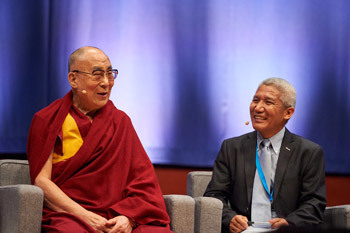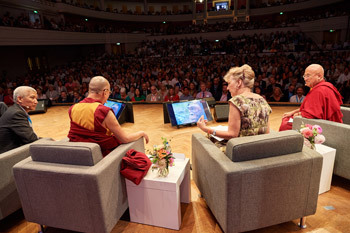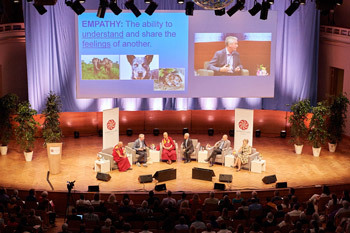Brussels, Belgium, 9 September 2016 - This morning the streets of Brussels were still quiet as His Holiness the Dalai Lama drove to the Bozar Centre for Fine Arts. The route took him past grand government buildings, various ornate churches and the impressive equestrian statue of the Crusader Godfried of Bouillon in Royal Square. Walking from the car through the Bozar Centre to the Henry le Boeuf Hall, old friends, well-wishers and members of the public pressed forward to interact with him.
Once His Holiness and the first session’s panellists, as well as the audience of 1900 people had taken their seats, Managing Director of Mind & Life Europe, Sander Tideman welcomed them to the 31st Mind & Life dialogue, the first in Brussels, the capital of Europe. He expressed gratitude to all who had contributed to the organization of the event, particularly the volunteers. In his welcoming remarks Pierre Gurdjian President of The Université libre de Bruxelles (ULB) suggested that one aspect of the theme of the conference—Power & Care—was leadership, remarking that those who want to change the world are leaders.
Moderator for the morning session, Ven. Matthieu Ricard said there were three days to explore the relations between power and care, during which he hoped it would be possible to find a healthy balance between the two. He invited Prof Franz de Waal to open discussions under the heading Ethology. De Waal talked about what he has learned from close study of chimpanzees and bonobos about power and relations of dominance. He identified the bipedal swagger of the dominant male and the bow of the submissive one, amusingly comparing photos of primates with those of known politicians. De Waal pointed out that the leadership of a dominant male chimpanzee or bonobo can involve a combination of power and care, for one of the ways he exercises it is to put a stop to fights in the troop. And while consoling is generally associated with females, the dominant males exhibit a talent for this too.
Asked to comment, His Holiness replied:

|
Dr Thubten Jimpa, His Holiness the Dalai Lama's interpreter, looks on as His Holiness comments on the presentations at the Mind & Life Dialogue at the Bozar Centre in Brussels, Belgium on September 9, 2016. Photo/Olivier Adam
|
“I’m very glad to be here attending this Mind & Life meeting and appreciate all the effort that has gone into making it happen. We’ve been holding meetings like this for more than 30 years now and I’d like to pay tribute to Francisco Varela, who was an early inspired participant. During my first visit to Europe in 1973, I began to realize that while many of these countries were highly developed, not all their people were happy. They suffered from too much stress and competition. Material development provides physical comfort, but does not set the mind at ease. I thought that sharing methods for establishing inner peace, irrespective of your personal belief, might contribute to creating a better world. At the time I was warned off by members of our monastic community afraid that science would disrupt our traditions and Western friends who warned that science is the destroyer of religion. We went ahead, embarked on our discussions and now here we are in Europe.”
His Holiness spoke of the conflicts that have wracked Europe in the past culminating in the violence and destruction of two World Wars. In the light of this the formation of the European Union was a great idea and a sign of maturity. He quoted his one-time physics tutor Carl Friedrich Freiherr von Weizsäcker, who told him that in his childhood for the French every German was an enemy and for every German the French were viewed likewise, but no more. This has changed.
He praised Mind & Life for paying attention not only to material developments, but also to their accompanying inner values. The result he hopes to see is more widespread physical well-being and inner peace. He pointed out that it is not only those who believe in religion who need love and compassion—we all do. Although studying chimpanzees can tell us something about human behaviour, His Holiness remains sceptical about what it can reveal about human intelligence, the misuse of which leads to conflict.

|
Prof. em. Sarah Blaffer Hrdy delivering her presentation during the morning session of the Mind & Life Dialogue at the Bozar Centre in Brussels, Belgium on September 9, 2016.
Photo/Olivier Adam
|
Prof em Sarah Blaffer Hrday, under the heading - Anthropology - examined different ways of nurturing infants. Where a chimpanzee mother may not break skin contact with her infant for the first four months of its life, among some human hunter-gatherers new born babies are handled by others right from the moment of birth. The difference is that the humans are aware that others’ help is essential if the child is to survive. A human child can be dependent for 15 years, during which time mothers receive a lot of help.
His Holiness mentioned something that has intrigued him. Where human mothers are compassionate and bond with their children, turtles lay their eggs in sand and are not present when they hatch. Between young turtles and their absent mothers there is no bond of affection.
He repeated that scientific findings that basic human nature is compassionate is a source of hope. It means that if we make the effort, we can make positive change. He said that the natural openness of children, who do not care about superficial differences with their playmates, often does not survive into adulthood because of the inadequacies of an education system that has little room for inner values.
|
His Holiness the Dalai Lama thanking Prof Johan Rochström after his presentation at the Bozar Centre in Brussels, Belgium on September 9, 2016. Photo/Olivier Adam
|
In connection with Ecology, Prof Johan Rochström explained that we have built our economies on wrong assumptions. We assumed that we are a small world on a big planet, whereas we have become a large world on a small planet. Although the planet seemed to be able to cope until 1990, we are now on the tipping point of catastrophe. On a brighter note he pointed out that action was taken to address ozone depletion and the damage was repaired—now we need to establish a fossil-fuel free future.
Listening with interest and concern, His Holiness’s comment was “Wonderful, thank you,” and the meeting broke for lunch.
The afternoon session, moderated by Roshi Joan Halifax, focused on perspectives from psychology, endocrinology and neuroscience. Prof Dr Alexandra Freund began by contrasting powerful people. She suggested that if asked to name someone really powerful, people might mention Hitler or Mao. However, she suggested that in taking power from the British and delivering it to the Indian people, Mahatma Gandhi exercised great power through peaceful means. She spoke of the power motive, referring to the goal to which you direct your efforts. She said power is about exerting influence, whether over people or the environment and that we can discern a dark and a bright side to power.
|
Many of the over 1900 people attending the Mind & Life Dialogue enjoying a moment of laughter during Prof Dr Markus Heinrichs' presentation at the Bozar Centre's Henry le Boeuf Hall in Brussels, Belgium on September 9, 2016. Photo/Olivier Adam
|
Concerning endocrinology Prof Dr Markus Heinrichs talked about the effects of hormones such as oxytocin, testosterone and cortizone. He concluded that distributing the ‘love hormone’ oxytocin through air conditioning systems or nasal sprays was not going to change the world.
Prof Dr Tania Singer, a Neuroscientist talked about her findings in relation to power and care from work she has done with people undertaking secular meditation training in care and compassion. She observed that people do not just become more compassionate with age. It’s necessary to engage with compassion through training and involves effort. What’s more, meditation is not a universal panacea, the effect of your meditation depends on what meditation you do. Recent findings in neuroscience suggest that altruism and compassion can indeed be developed through training, leading to brain plasticity and pro-social behaviour.
|
Prof Dr Richard Schwartz delivering his presentation during the afternoon session of the Mind & Life Dialogue in Brussels, Belgium on September 9, 2016. Photo/Olivier Adam
|
Prof Dr Richard Schwartz is a psychiatrist who works with family systems. He suggested that destructive emotions are often the expressions of power and care that have become extreme. He intrigued the audience with his tale of a patient who was concerned about his impulse to kill his ex-wife. He struggled with this and resisted examining why he felt this way. When he was finally persuaded to do so he became aware of a fear of powerlessness that derived from an episode in his childhood. Dr Schwartz concluded:
“My message is that we should address our inner enemies with the same care and compassion that His Holiness advocates applying to our external foes.”
In his closing remarks, His Holiness said:
“I appreciate people’s taking interest in mind and emotions. This is a good beginning. I mentioned this morning that the real trouble makers are in our own minds. If you have peace within, external problems will not disturb your mind. You may even be able to manage your own pain. When it comes to meditation, analytical meditation, in contrast to concentrative meditation or mere mindfulness, require us to employ our intelligence.
|
His Holiness the Dalai Lama delivering his closing remarks at the end of the afternoon session of the Mind & Life Dialogue at the Bozar Centre in Brussels, Belgium on September 9, 2016. Photo/Olivier Adam
|
“As far as developing compassion is concerned we all have a basic biological response derived from the affection we receive as young children to build on. Tania Singer asked if there is a sequence to its development and there is. Normally we start by developing a sense of equanimity.
“None of us wants problems and yet we create so many for ourselves. If we want to change, where do we start? Not with the government or big institutions, but with ourselves as individuals. Through transforming our minds and developing inner values we can change ourselves, influence our families and communities and so bring about a change in humanity. Starting with ourselves we have to let compassion become part of our daily lives.”
The conference will continue tomorrow with sessions looking at perspectives from spiritual and religious traditions and from economics and society.



